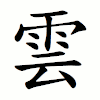雲
| ||||||||
Translingual
| Stroke order (Taiwan) | |||
|---|---|---|---|
 | |||
| Stroke order | |||
|---|---|---|---|
 | |||
Han character
雲 (Kangxi radical 173, 雨+4, 12 strokes, cangjie input 一月一一戈 (MBMMI), four-corner 10731, composition ⿱⻗云)
- Shuōwén Jiězì radical №423
Related characters
References
- KangXi: page 1372, character 5
- Dai Kanwa Jiten: character 42235
- Dae Jaweon: page 1879, character 16
- Hanyu Da Zidian (first edition): volume 6, page 4058, character 9
- Unihan data for U+96F2
Chinese
| trad. | 雲 | |
|---|---|---|
| simp. | 云* | |
| alternative forms | 云 ancient | |

Glyph origin
| Historical forms of the character 雲 | |
|---|---|
| Shuowen Jiezi (compiled in Han) | Liushutong (compiled in Ming) |
| Small seal script | Transcribed ancient scripts |
 |
 |
Ideogrammic compound (會意) and phono-semantic compound (形聲, OC *ɢun) : semantic 雨 (“rain”) + phonetic 云 (OC *ɢun, “cloud”). Originally written 云, with the 雨 radical added to 云 to distinguish from the borrowed sense of “to speak”.
Etymology
Very few outside cognates exist. Starostin compares it with Mizo vân (“sky, the skies, heaven”) and Karbi inghun (“cloud”).
Alternatively, this is a derivation from a root meaning “to revolve”. Compare 運 (OC *ɢuns, “to move”), 回 (OC *ɡuːl, “to whirl, to circle”) (Schuessler, 2007).
Pronunciation
Definitions
雲
- cloud (Classifier: 片 m; 朵 m; 嚿 c)
- 上天同雲,雨雪雰雰。 [Pre-Classical Chinese, trad.]
- From: The Classic of Poetry, c. 11th – 7th centuries BCE, translated based on James Legge's version
- Shàngtiān tóng yún, yǔxuě fēnfēn. [Pinyin]
- The heavens over head are one arch of clouds, snowing in multitudinous flakes.
上天同云,雨雪氛氛。 [Pre-Classical Chinese, simp.]- 化而為鳥,其名為鵬。鵬之背,不知其幾千里也;怒而飛,其翼若垂天之雲。 [Classical Chinese, trad.]
- From: Zhuangzi, circa 3rd – 2nd centuries BCE
- Huà ér wéi niǎo, qí míng wéi Péng. Péng zhī bèi, bùzhī qí jǐ qiān lǐ yě; nù ér fēi, qí yì ruò chuítiān zhī yún. [Pinyin]
- [This fish] changes into a bird with the name of Peng, the back of which is I do not know how many miles in extent. When this bird rouses itself and flies, its wings are like clouds all round the sky.
化而为鸟,其名为鹏。鹏之背,不知其几千里也;怒而飞,其翼若垂天之云。 [Classical Chinese, simp.]
- (computing) cloud
- (figurative) many; numerous
- Short for 雲南/云南 (Yúnnán, “Yunnan”).
- a surname
Synonyms
Compounds
|
|
|
References
- “雲”, in 漢語多功能字庫 (Multi-function Chinese Character Database), 香港中文大學 (the Chinese University of Hong Kong), 2014–
Japanese
Readings
Compounds
Etymology 1
| Kanji in this term |
|---|
| 雲 |
| くも Grade: 2 |
| kun’yomi |

⟨kumo1⟩ → */kumʷo/ → /kumo/
From Old Japanese.
Ultimately from Proto-Japonic *kumo.
Possibly an ancient nativized borrowing from Old Chinese 雲 (*ɢun).
Noun
雲 • (kumo)
- a cloud (visible mass of water droplets or other related material suspended in the air)
- (by extension) of how clouds are widely spread:
- (by extension) of how clouds are high above in the sky:
- (by extension) the smoke during cremation that is thought to be the soul of the deceased person ascending into the heavens
- a style of 家紋 (kamon, “family crest”) with a design of cloud(s), usually associated with major Buddhist temples
Quotations
For quotations using this term, see Citations:雲.
Derived terms
- 曇る (kumoru)
- 雲合い (kumoai, “look of the sky”)
- 雲脚 (kumoashi), 雲足 (kumoashi, “movement of clouds”)
- 雲居 (kumoi)
- 雲霞 (kumokasumi)
- 雲隠れ (kumogakure)
- 雲形 (kumogata)
- 雲霧 (kumokiri)
- 雲煙 (kumokeburi)
- 雲助 (kumosuke, “palanquin bearer”)
- 雲突く (kumotsuku, “to tower”)
- 雲の上 (kumo no ue)
- 雲の上人 (kumo no uebito)
- 雲間 (kumoma)
- 雲行き (kumoyuki, “weather; look of the sky; situation”)
- 雲を霞 (kumo o kasumi)
- 雨雲 (amagumo)
- 出雲 (Izumo)
- 浮き雲 (ukigumo)
- 薄雲 (usugumo)
- 風雲 (kazekumo), 風雲 (kazagumo)
- 雷雲 (kaminarigumo)
- 黒雲 (kurokumo)
- 白雲 (shirakumo)
- 夏雲 (natsugumo)
- 八雲 (yakumo)
- 雪雲 (yukigumo)
- 綿雲 (watagumo)
Idioms
- 雲衝く (kumotsuku)
- 雲に臥す (kumo ni fusu)
- 雲を掴む (kumo o tsukamu)
- 雲を遏む (kumo o todomu)
Proverbs
- 雲となり雨となる (kumo to nari ame to naru)
- 雲に梯 (kumo ni kakehashi)
- 雲に汁 (kumo ni shiru)
- 雲は竜に従い風は虎に従う (kumo wa ryū ni shitagai kaze wa tora ni shitagau)
Affix
雲 • (un)
Derived terms
- 雲煙 (un'en)
- 雲霞 (unka)
- 雲海 (unkai)
- 雲客 (unkaku)
- 雲気 (unki)
- 雲脚 (unkyaku)
- 雲級 (unkyū)
- 雲形 (unkei)
- 雲州 (Unshū)
- 雲集 (unshū)
- 雲散 (unsan)
- 雲桟 (unsan)
- 雲水 (unsui)
- 雲泥 (undei)
- 雲伯 (Unpaku)
- 雲豹 (unpyō)
- 雲霧 (unmu)
- 雲母 (unmo), 雲母 (unbo)
- 雲竜 (unryū)
- 雲量 (unryō)
- 暗雲 (an'un)
- 夏雲 (kaun)
- 暁雲 (gyōun)
- 巻雲 (ken'un)
- 黒雲 (kokuun)
- 彩雲 (saiun)
- 紫雲 (shiun)
- 青雲 (seiun)
- 瑞雲 (zuiun)
- 星雲 (seiun)
- 積雲 (sekiun)
- 戦雲 (sen'un)
- 白雲 (hakuun)
- 風雲 (fūun)
- 雷雲 (raiun)
See also
- クラウド (kuraudo)
Korean
Etymology
From Middle Chinese 雲 (MC ɦɨun). Recorded as Middle Korean 운 (wun) (Yale: wun) in Hunmong Jahoe (訓蒙字會 / 훈몽자회), 1527.
Compounds
Old Japanese
Etymology 1
From Proto-Japonic *kumo.
Noun
雲 (kumo1 → kumo) (kana くも)
Quotations
For quotations using this term, see Citations:雲.
Derived terms
Descendants
- Japanese: 雲 (kumo)
Etymology 2
(This etymology is missing or incomplete. Please add to it, or discuss it at the Etymology scriptorium.)
Derived terms
- 青雲 (awokumu)